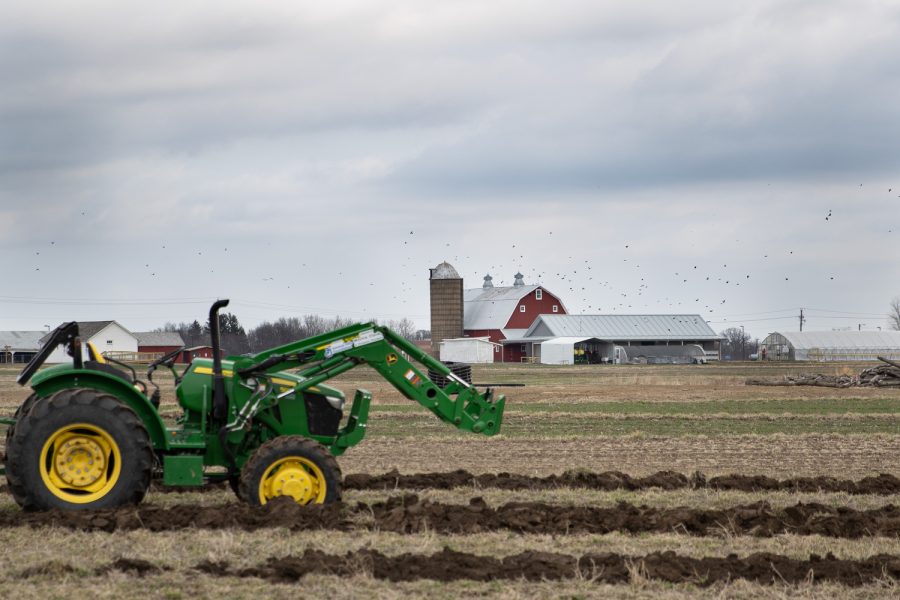Johnson County Historic Poor Farm halfway through the 10-year master plan
The plan, first adopted in 2017, aimed to update the farm for public use while also continuing to provide farmers access to the land to work on.
A tractor is seen at the Johnson County Historic Poor Farm in Iowa City on March 31, 2023.
April 2, 2023
On a 160-acre plot of land on the outskirts of Iowa City sits a farm with a history dating back to the 19th century. The Johnson County Historic Poor Farm has been renovated for the past six years and can now facilitate farmers and open to the public.
Located at 4811 Melrose Ave., the Johnson County Historic Poor Farm has been the subject of extensive work by Johnson County to update and renovate the farm.
Built in 1855, the Historic Poor Farm was one of many poor farms built in the U.S. designed to house individuals experiencing poverty or people with mental and physical disabilities.
According to the farm’s website, the county operated the property as a poor farm until 1988, when the land was farmed privately or by nonprofits.
Over time, the farm fell into disrepair, with some people even using it as a landfill, Johnson County Supervisor V Fixmer-Oraiz said.
“Some of it was being used by Secondary Roads for storage, [and] there’s a lot of trash just because it was so far on that side of town. People didn’t want to go as far to the landfill, so they would just dump refrigerators and that kind of stuff there,” Fixmer-Oraiz said.
In 2016, the supervisors voted to restore the farm and make it available to the public. This work started with the adoption of a master plan created by Jason Grimm of Iowa Valley RC&D and Fixmer-Oraiz.
Fixmer-Oraiz said it took seven to eight months to complete a master plan that aligned with the county’s desires. They said things like conservation, historic preservation, and farming made up parts of the plan.
The plan was split into three phases.
Phase one focused on researching the site and working with stakeholders, which proposes creating a county park, a collaborative landscape, and a new-century farm. Of these, the county selected the new century farm, which emphasized using the site both for farming and public use.
With phase one completed, the county moved to phase two of the project, which involved expanding on the initial plan.
Work in this phase involved examining the farm’s environment and additions that could be made to existing facilities, including adding new signage, improving an existing picnic area, and repairing the buildings.
Fixmer-Oraiz said there was communication with different groups to account for the different needs of the farm, including conservation groups. Work was also completed to follow the American Disabilities Act.
The plan’s third phase was implemented in 2017.
RELATED: IC officials see changes in Burlington Street Dam as unique opportunity for good
Heading into year six of the project, much work has been completed. Before being elected supervisor in 2022, Fixmer-Oraiz provided the supervisors with regular updates on the farm’s progress. Most of the historic buildings had been repaired and restored, including the barn, dairy barn, and asylum.
The county has also leased small plots of land at the farm under the county’s land access program, Ilsa DeWald, Johnson County Local Foods coordinator, said. The program provides tenants with some land, irrigation, and equipment storage.
“A lot of the farmable land was [previously] rented out and grown in conventional row crops, and over the past couple of years, we have transitioned all the row crop land into either hay pasture or land that is available for inner community production area or land access program area,” DeWald said.
Carly McAndrews, who has farmed on the land since 2019 with Trowel and Error Farm, said she was happy to have been part of the land access program because it gave her the opportunity and access to farm.
“We didn’t stand to inherit land or anything like that, so having access to affordable land, with stuff like water [and] electricity, has been just really important to getting our feet on the ground,” McAndrews said.
Nonprofit groups have also found a home on the farm. Grimm said most tenants started to come out and plant their crops. He also said it was set to be busier thanks to the construction going on at the same time as the farming.
According to the farm’s website, the prices for the program are $35 per one-eighth an acre of land, $150 per year for irrigation access, and $100 per bay for storage access. DeWald said the county would provide tenants a three-year agreement for the land, and that since beginning the program, it has regularly been at max capacity.



